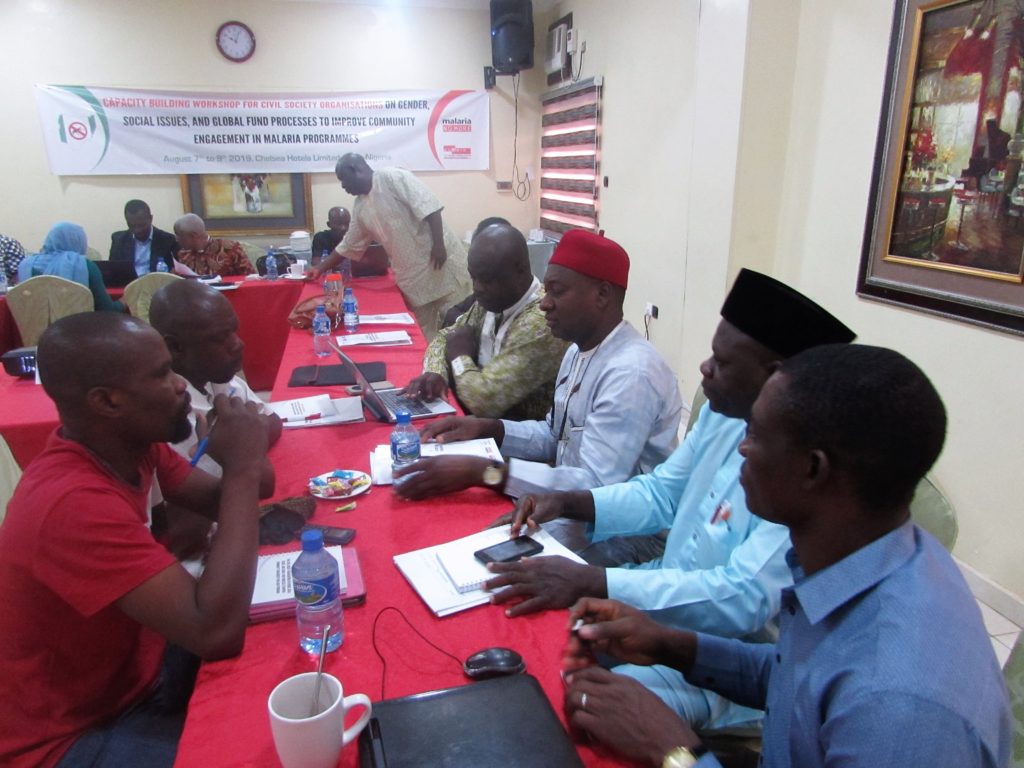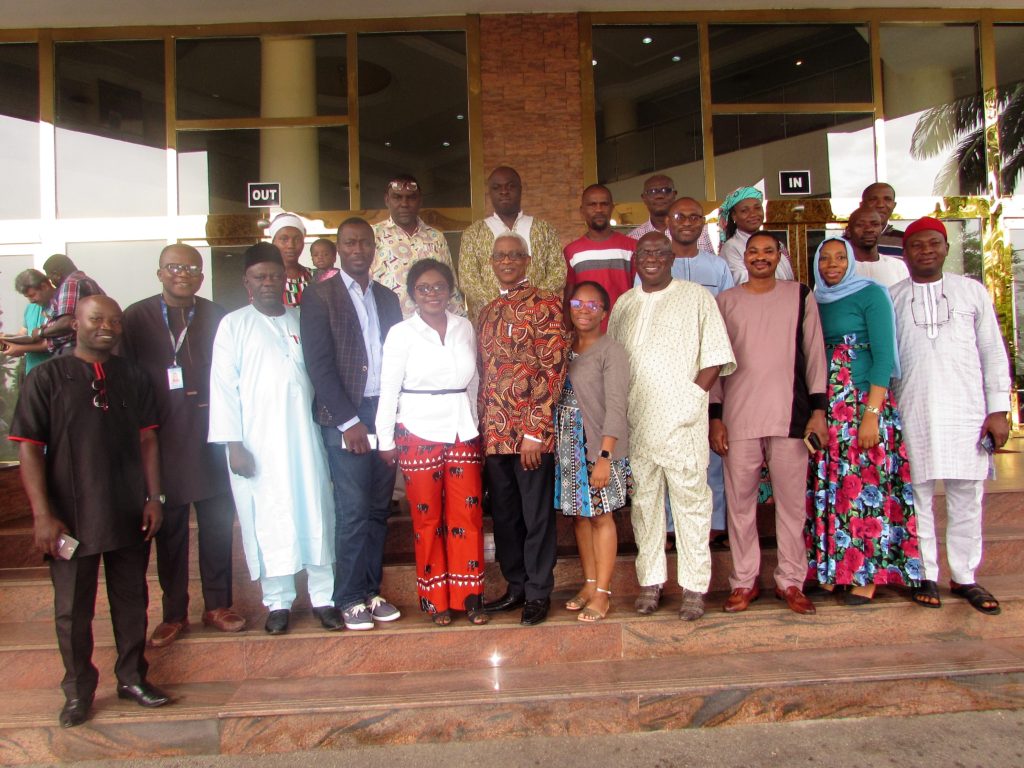Nigeria has been identified as top on the global radar of malaria world burden. The country is said to have some 53 million cases of the disease (that is 1 in every 4 persons) per year, with about 81,640 people dying yearly (about 1 in 5 global deaths), accounting for 25 per cent of the global malaria burden. Nigeria also accounts for half of the malaria-related deaths in the African sub region.

This emerged at a capacity building workshop jointly organised by Malaria No More, a non-profit organisation based in Yaounde, Cameroon, and Abuja-based Civil Society in Malaria Control, Immunization and Nutrition (ACOMIN)for civil society organisations (CSOs) on gender, social issues and Global Fund processes to improve community engagement in malaria programmes, held on 7 August, 2019, in Abuja.
Participants, who were drawn from various parts of Nigeria, agreed that economic burden of malaria is high, especially in Nigeria and the Democratic Republic of Congo in particular and Africa at large, with impact on reduced productivity and hike in poverty levels.
This is why the Nigerian government has come up with a programme styled ‘Malaria-free Nigeria’, whose goal is to reduce malaria-related burdens to zero by 2020. To boost this goal, partners started lending support in 2002, with Global Fund accounting for the bulk of the funding, followed by the Government of Nigeria, and USAID, among others. However, funding dropped significantly between 2015 and 2018. During this period, 13 states were, and remain without adequate support and funding in most of their activities.
Mr. Chukwu Okoronkwo, Representative of Nigeria’s National Malaria Elimination Programme (NMFP) described malaria as one of the biggest public health issues in Nigeria and undoubtedly in Africa.
He, however, averred that there was hope for eradication of the malaise, due to the huge involvement and investment from CSOs, especially in the area of community engagement and mobilisation, which have improved despite glaring funding gaps.
Chukwu used the forum to sue for increased community engagement and mobilisation, while stressing that discussions around “leaving no one behind” and gender concerns should be considered and approached from geographical and socio-economic equity perspectives and factored into programming and operations.
Meanwhile, the Acting chair of the Country Coordinating Mechanism (CCM), Madam Maureen Onya, observed that the interphase between CSOs and Government was still weak, and therefore called for the prioritisation of the development of strategic preventive actions, such as addressing environmental issues that lead to the breeding of Malaria.
According to the CCM chief, inadequate funding remains a major setback to the fight against malaria in Nigeria and elsewhere on the African continent. Onya revealed that from an expected national fund of $33 million in Nigeria, there still exists a huge gap of $16 million.
She said currently, the government of Nigeria contributes about 600 million naira (about $1.7 million) through waivers, while adding that strategies like more private sector engagement and advocacy for more partners could be used to address the gaps, which could result in further economic losses and increased morbidity and mortality.
She also stressed the need for adequate funding, more research in the manufacture of malaria intervention commodities, improved security, political will by leaders, strategic information sharing and management, and better guidance. Other strategies include coordinated response, the organisation of a National Malaria Dialogue (NMD), and advocacy for increased domestic funding.

Despite tremendous progress, malaria remains one of the top killers of children under five and is a major cause of poverty and inequity in Africa. This is why Malaria No More believes that increasing investments to end the malaria scourge will save millions more lives, mostly pregnant women and children in the continent. Malaria is one of oldest and deadliest diseases, devastating families, communities, and countries.
Yet, Malaria No More has the tools to end the malaria burden in a generation. This is why the organisation is putting all its energy into ensuring that malaria is no more. It is worthy of note that in 2017, malaria claimed 435,000 lives and caused 219 million cases globally.
The disease accounts for half of missed days in African schools. Yet, healthy children can go to school and learn more effectively, ultimately impacting their ability to earn a living. Keeping children healthy enables parents to go to work and reduce the need to spend their wages on malaria treatments and healthcare.
Besides the deaths and other challenges involved, malaria prevents families and communities from prospering. So, by sustaining investments in ending malaria and improving health, economic growth and human potential can be unlocked.
It has been noted that malaria-free countries have five times greater economic growth than countries with the burden, and every $1 invested in malaria control in Africa returns $40 in economic growth, thereby contributing to Africa’s prosperity and its prospects as a trading partner.
To this end, malaria research is also developing next generation tools and strategies to help fight Zika, dengue, and other mosquito-borne diseases, and to prevent epidemics. Malaria research is developing next generation tools and strategies to help fight Zika, dengue, and other mosquito-borne diseases and to prevent epidemics. In other words, besides diagnosing and treating malaria, healthcare workers are also trained to fight other diseases and respond quickly to an emerging epidemic.
Malaria No More is seeking concerted efforts by communities and nations to accelerate the path to eliminating malaria. Thanks to historic progress against this disease, the organisation has set its sights on an ambitious target: ending malaria in the world’s lifetimes.
With 11 countries on track to eliminate malaria by 2020, the organisation deems it critical to ensure that funding, innovation and leadership are in place to meet this milestone and put the world on the path to make malaria no more.
According to former Liberia president Ellen Johnson Sirleaf, who is also member of End Malaria Council, “stunning progress against malaria in the past decade has allowed the world to imagine a different future.” In fact, during the decade, about seven million lives were saved and one billion cases prevented.
According to Olivia Ngou, Malaria No More Consultant, the organisation continuously seeks to fuel the fight to end malaria, while envisioning a world where no one dies from a mosquito bite. She said more than a decade into the organisation’s mission, its work has contributed to historic progress toward this goal.
“Now, we are mobilising the political commitment, funding, and innovation required to achieve what would be one of the greatest humanitarian accomplishments – ending malaria within our generation”, she said.
It is worth noting that thanks to sustained efforts by the US and partner governments, non-profit organisations and individuals, the world has made historic progress in the fight against malaria. This progress has unlocked immeasurable human potential, improved the health of hundreds of millions of people and will save and improve lives for generations to come.
The three-day workshop featured presentations on various issues, such as the state of malaria in Nigeria; country coordination mechanism; community guide addressing best practices, gender, social and human right-related issues in the fight against malaria, especially in West and Central Africa; CSO information manual for meaningful engagement in Global Fund projects and processes and other malaria-related programmes; group work; restitution; and validation of community engagement plans.